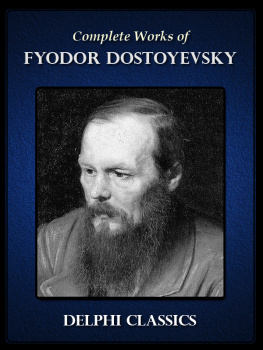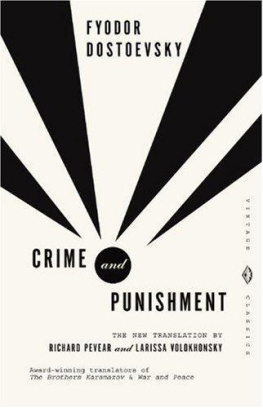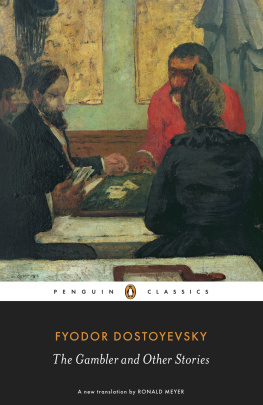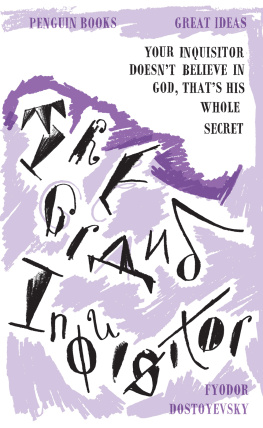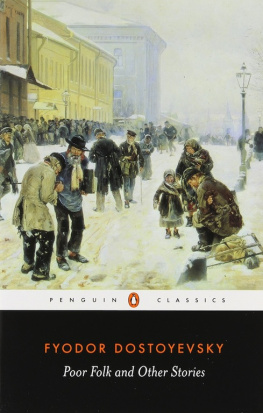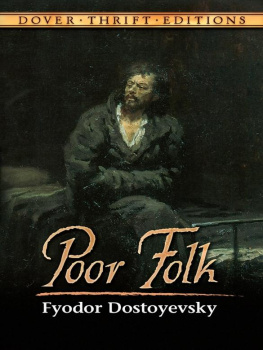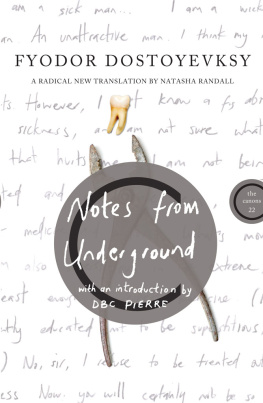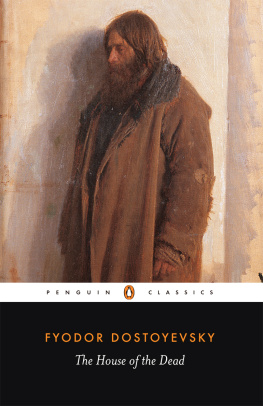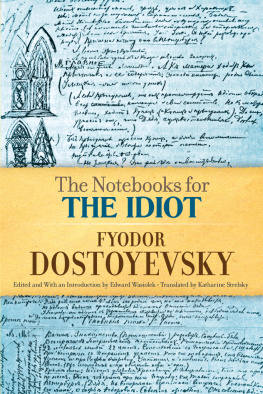Fyodor Dostoyevsky - Notes from Underground and The Double
Here you can read online Fyodor Dostoyevsky - Notes from Underground and The Double full text of the book (entire story) in english for free. Download pdf and epub, get meaning, cover and reviews about this ebook. year: 2010, publisher: Penguin Group USA, Inc., genre: Art. Description of the work, (preface) as well as reviews are available. Best literature library LitArk.com created for fans of good reading and offers a wide selection of genres:
Romance novel
Science fiction
Adventure
Detective
Science
History
Home and family
Prose
Art
Politics
Computer
Non-fiction
Religion
Business
Children
Humor
Choose a favorite category and find really read worthwhile books. Enjoy immersion in the world of imagination, feel the emotions of the characters or learn something new for yourself, make an fascinating discovery.
- Book:Notes from Underground and The Double
- Author:
- Publisher:Penguin Group USA, Inc.
- Genre:
- Year:2010
- Rating:5 / 5
- Favourites:Add to favourites
- Your mark:
- 100
- 1
- 2
- 3
- 4
- 5
Notes from Underground and The Double: summary, description and annotation
We offer to read an annotation, description, summary or preface (depends on what the author of the book "Notes from Underground and The Double" wrote himself). If you haven't found the necessary information about the book — write in the comments, we will try to find it.
Notes from Underground and The Double — read online for free the complete book (whole text) full work
Below is the text of the book, divided by pages. System saving the place of the last page read, allows you to conveniently read the book "Notes from Underground and The Double" online for free, without having to search again every time where you left off. Put a bookmark, and you can go to the page where you finished reading at any time.
Font size:
Interval:
Bookmark:

NOTES FROM UNDERGROUND
THE DOUBLE
FYODOR MIKHAILOVICH DOSTOYEVSKY was born in Moscow in 1821, the second of a physicians seven children. His mother died in 1837 and his father was murdered a little over two years later. When he left his private boarding school in Moscow he studied from 1838 to 1843 at the Military Engineering College in St Petersburg, graduating with officers rank. His first story to be published, Poor Folk (1846), was a great success. In 1849 he was arrested and sentenced to death for participating in the Petrashevsky circle; he was reprieved at the last moment but sentenced to penal servitude, and until 1854 he lived in a convict prison at Omsk, Siberia. In the decade following his return from exile he wrote The Village of Stepanchikovo (1859) and The House of the Dead (1860). Whereas the latter draws heavily on his experiences in prison, the former inhabits a completely different world, shot through with comedy and satire. In 1861 he began the review Vremya (Time) with his brother; in 1862 and 1863 he went abroad, where he strengthened his anti-European outlook, met Mile Suslova, who was the model for many of his heroines, and gave way to his passion for gambling. In the following years he fell deeply in debt, but in 1867 he married Anna Grigoryevna Snitkina (his second wife), who helped to rescue him from his financial morass. They lived abroad for four years, then in 1873 he was invited to edit Grazhdanin (The Citizen), to which he contributed his Diary of a Writer. From 1876 the latter was issued separately and had a large circulation. In 1880 he delivered his famous address at the unveiling of Pushkins memorial in Moscow; he died six months later in 1881. Most of his important works were written after 1864: Notes from Underground (1864), Crime and Punishment (18656), The Gambler (1866), The Idiot (1869), The Devils (1871) and The Brothers Karamazov (1880).
FYODOR DOSTOYEVSKY

The Double

TRANSLATED
WITH AN INTRODUCTION BY
JESSIE COULSON
PENGUIN BOOKS
PENGUIN BOOKS
Published by the Penguin Group
Penguin Books Ltd, 80 Strand, London WC2R 0RL, England
Penguin Putnam Inc., 375 Hudson Street, New York, New York 10014, USA
Penguin Books Australia Ltd, 250 Camberwell Road, Camberwell, Victoria 3124, Australia
Penguin Books Canada Ltd, 10 Alcorn Avenue, Toronto, Ontario, Canada M4V 3B2
Penguin Books India (P) Ltd, 11 Community Centre, Panchsheel Park, New Delhi 110 017, India
Penguin Books (NZ) Ltd, Cnr Rosedale and Airborne Roads, Albany, Auckland, New Zealand
Penguin Books (South Africa) (Pty) Ltd, 24 Sturdee Avenue, Rosebank 2196, South Africa
Penguin Books Ltd, Registered Offices: 80 Strand, London WC2R 0RL, England
www.penguin.com
Notes from the Underground first published as
Zapiski iz Podpolya 1864
The Double first published as Dvoynik 1846
This translation published 1972
Reprinted with new Chronology 2003
42
Copyright Jessie Coulson, 1972
Chronology copyright David McDuff, 2003
All rights reserved
Except in the United States of America, this book is sold subject to the condition that it shall not, by way of trade or otherwise, be lent, re-sold, hired out, or otherwise circulated without the publishers prior consent in any form of binding or cover other than that in which it is published and without a similar condition including this condition being imposed on the subsequent purchaser
EISBN: 9781101488164
WHEN the young Dostoyevsky began work on his second novel, The Double, in the May or June of 1845, he was glowing with the excitement and delight, the sort of shy rapture of what he still thought of thirty-two years later as the most wonderful moment of his whole life, when the great critic Belinsky had said to him: Cherish your gift, remain true to it, and you will be a great writer, and he had come away in an ecstasy, stopped in the street and vowed to himself that he would remain true, he would be worthy of such praise. Poor Folk, the novel that had aroused the enthusiasm of Belinsky and of the poet Nekrasov, almost as influential in the Russian literary world, was not published until January 1846, and meanwhile Dostoyevsky basked in warmth and admiration, drunk with my own fame. The sobering morning after had followed soon enough; Poor Folk was less rapturously received by the general public than its author had been led to expect by the attitude of literary and fashionable St Petersburg, and the reception of The Double when it appeared only a fortnight later was a mixture of positive hostility and profound indifference. Dostoyevsky, who had been declaring in his letters to his brother that his new novel, usually referred to as Golyadkin, was ten times better than Poor Folk, now felt disgusted with Golyadkin. A great deal of it was written in haste and fatigue. The first half is better than the second. Alongside brilliant pages there is trash and rubbish that turns the stomach; one cant read it.
He was now being as excessive in decrying his own work as he had earlier been extravagant in his expectations of it. The book is the production of a writer too young and inexperienced to be anything but derivative in plot and manner and yet as Belinsky had told him possessing the direct intuition of the artist and capable of becoming great. Its most obviously striking quality is perhaps its immense readability; it demands to be swallowed in one gulp. The style may be modelled, not entirely successfully on Gogols, but it flows as swiftly as a river in flood, and conveys a feeling of urgent excitement and apprehension.
The Gothic subject of a man haunted or possessed by his exact double must have seemed conventional enough at the time: it might have cropped up in the work of Gogol or as one of the tales of the still-popular Hoffmann. The choice of a government clerk as hero was also almost a formula of the age; Makar Devushkin, too, the hero of Dostoyevskys first novel, was a clerk in the government service. But there is nothing stereotyped or commonplace about the handling of the theme or the character of Mr Golyadkin. The Double is unmistakably Dostoyevskyan in its ability to see everything that happens from inside the skin, so to speak, of its hero.
Mr Golyadkin finds himself snubbed and derided by his superiors in the official hierarchy and in society, and it is at the end of a humiliating day that began with high, if not entirely confident, expectation that he first encounters his double. The double not only resembles him physically, he bears the same name and comes from the same part of the provinces. Almost at once, this Mr Golyadkin junior becomes the most important factor in Mr Golyadkin seniors life, inspiring his enemies (Mr Golyadkin senior feels that he is surrounded by enemies), working against him, usurping his place, appropriating his work and the credit attached to it, and finally driving him mad. But is this really what happens? Does Mr Golyadkin junior exist in cold fact? Perhaps the real horror of Mr Golyadkins position is that he unconsciously knows that his double is simply that side of his own nature that he disapproves of and fears? The vehemence with which he assures himself that he is no different from anybody else and that there is nothing out of the ordinary in his strangest actions, the anxiety with which he rehearses the things he will say or the letters he will write, the curious ambiguity of his early encounter with Dr Rutenspitz, the vaguely menacing quality of this apparently mild and benevolent gentleman, all afford us hints and glimpses of dark shapes moving in the depths of the pool whose still and shining surface is all that meets our eyes at first. Some of the later episodes in the book produce almost the effect of being extracts from the classic studies of split personalities which were not written until half a century later.
Next pageFont size:
Interval:
Bookmark:
Similar books «Notes from Underground and The Double»
Look at similar books to Notes from Underground and The Double. We have selected literature similar in name and meaning in the hope of providing readers with more options to find new, interesting, not yet read works.
Discussion, reviews of the book Notes from Underground and The Double and just readers' own opinions. Leave your comments, write what you think about the work, its meaning or the main characters. Specify what exactly you liked and what you didn't like, and why you think so.


